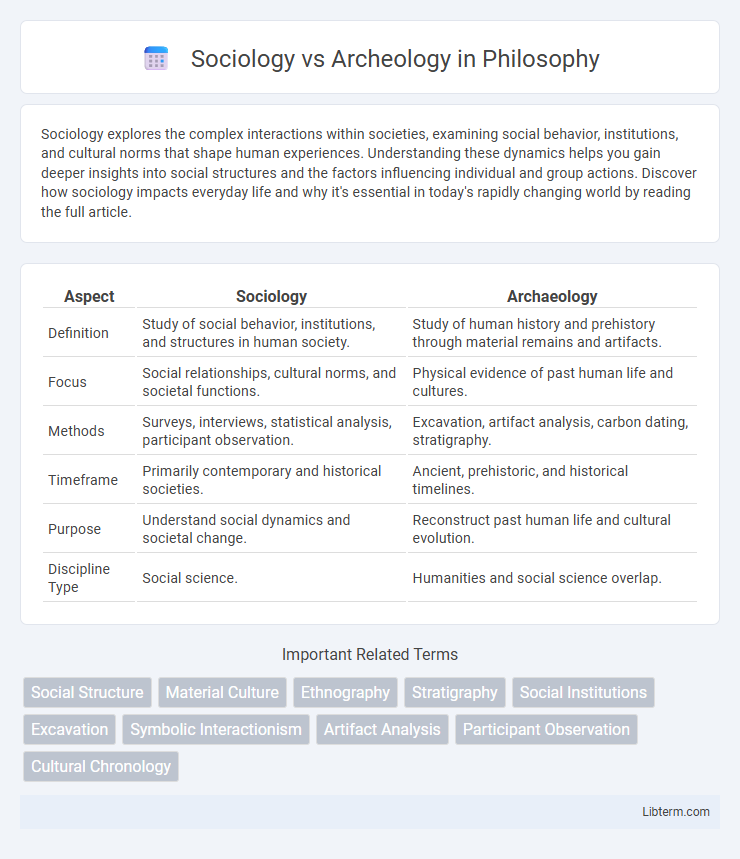Sociology explores the complex interactions within societies, examining social behavior, institutions, and cultural norms that shape human experiences. Understanding these dynamics helps you gain deeper insights into social structures and the factors influencing individual and group actions. Discover how sociology impacts everyday life and why it's essential in today's rapidly changing world by reading the full article.
Table of Comparison
| Aspect | Sociology | Archaeology |
|---|---|---|
| Definition | Study of social behavior, institutions, and structures in human society. | Study of human history and prehistory through material remains and artifacts. |
| Focus | Social relationships, cultural norms, and societal functions. | Physical evidence of past human life and cultures. |
| Methods | Surveys, interviews, statistical analysis, participant observation. | Excavation, artifact analysis, carbon dating, stratigraphy. |
| Timeframe | Primarily contemporary and historical societies. | Ancient, prehistoric, and historical timelines. |
| Purpose | Understand social dynamics and societal change. | Reconstruct past human life and cultural evolution. |
| Discipline Type | Social science. | Humanities and social science overlap. |
Introduction: Defining Sociology and Archaeology
Sociology is the systematic study of society, social relationships, and institutions, focusing on human behavior, social structures, and cultural norms. Archaeology examines past human activities through material remains, artifacts, and environmental data to reconstruct historical cultures and civilizations. Both disciplines analyze human experiences but differ in methods, with sociology emphasizing contemporary social dynamics and archaeology concentrating on historical contexts.
Historical Development of Both Disciplines
Sociology emerged in the 19th century as a systematic study of social behavior and institutions, influenced by thinkers like Auguste Comte and Emile Durkheim, focusing on modern social structures and processes. Archaeology developed earlier, with roots in antiquarianism and evolving into a scientific discipline during the 19th and 20th centuries, emphasizing the excavation and analysis of material remains to understand past human cultures. Both disciplines intersect in exploring human societies, but sociology prioritizes contemporary social analysis while archaeology reconstructs historical contexts through physical evidence.
Core Objectives: Comparing Research Goals
Sociology primarily investigates social behaviors, institutions, and structures to understand patterns of human interaction and societal organization. Archaeology focuses on uncovering and interpreting material remains to reconstruct past human activities and cultural developments over time. Both disciplines seek to explain human experiences but differ in their core research goals: sociology analyzes contemporary and historical social dynamics, while archaeology emphasizes tangible evidence from historical contexts.
Methodologies: Sociological vs Archaeological Approaches
Sociological methodologies emphasize qualitative and quantitative data collection through surveys, interviews, and participant observation to analyze social behaviors and structures in contemporary societies. Archaeological approaches rely on excavation, dating techniques, and material culture analysis to interpret past human activities and environmental contexts. Both disciplines integrate interdisciplinary tools but differ significantly in their temporal focus and types of data examined.
Key Theories and Frameworks
Sociology centers on theories like structural functionalism, conflict theory, and symbolic interactionism to analyze societal structures, power dynamics, and interpersonal relationships. Archaeology employs frameworks such as cultural-historical theory, processual archaeology, and post-processualism to interpret material culture and human behavior across time. Both disciplines utilize theoretical models to understand human societies but differ in focus: sociology emphasizes contemporary social patterns, while archaeology investigates historical and prehistorical contexts.
How Each Discipline Studies Human Societies
Sociology studies human societies by analyzing social behaviors, structures, and institutions through qualitative and quantitative methods such as surveys, interviews, and statistical analysis to understand contemporary social dynamics. Archaeology examines past human societies by uncovering and interpreting material remains like artifacts, architecture, and biofacts to reconstruct historical cultures and lifeways. Both disciplines contribute to knowledge of human social complexity, but sociology emphasizes present social interactions while archaeology focuses on historical and prehistoric contexts.
Types of Data: Textual, Material, and Observational
Sociology primarily relies on textual and observational data, analyzing written documents, surveys, interviews, and direct observations to understand social behaviors and structures. Archaeology focuses on material data, examining artifacts, architectural remains, and ecofacts to reconstruct past human activities and cultures. Both disciplines complement each other by combining textual and material evidence with observational insights to provide a comprehensive understanding of human societies across time.
Career Paths in Sociology and Archaeology
Career paths in sociology include roles such as social researcher, policy analyst, community development specialist, and academic professor, with opportunities in government agencies, non-profits, and private sectors focusing on social behavior and institutions. Archaeology career options encompass field archaeologist, museum curator, cultural resource manager, and heritage consultant, emphasizing excavation, artifact preservation, and historical site analysis. Both fields offer interdisciplinary collaboration but diverge in methods, with sociology emphasizing social theory and qualitative research, while archaeology combines scientific techniques and historical inquiry.
Impact on Understanding Modern Society
Sociology analyzes social behaviors, institutions, and cultural patterns to provide insights into current societal dynamics and issues such as inequality and social change. Archaeology uncovers material remains from past civilizations, offering evidence that contextualizes the development of human societies and long-term cultural evolution. Together, these disciplines deepen understanding of modern society by linking contemporary social phenomena with historical human experiences and cultural heritage.
Future Trends and Interdisciplinary Collaboration
Future trends in sociology emphasize the integration of big data analytics and artificial intelligence to understand complex social behaviors and patterns, while archaeology increasingly employs remote sensing technologies and DNA analysis to reconstruct past human activities. Interdisciplinary collaboration between sociology and archaeology enhances holistic insights by combining sociocultural theories with material evidence, enabling comprehensive studies of human societies across time. This synergy fosters innovative research methodologies that address both contemporary social challenges and historical contexts.
Sociology Infographic

 libterm.com
libterm.com